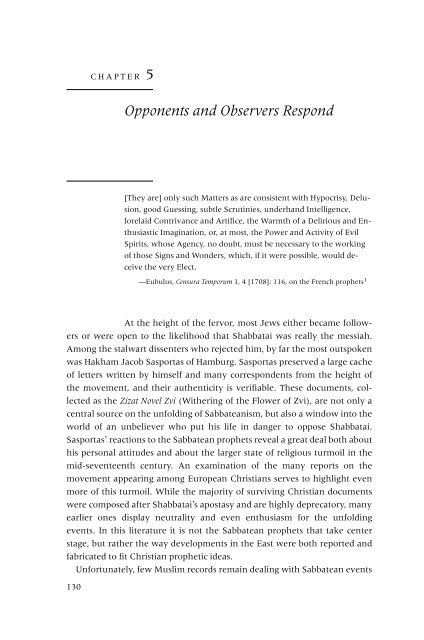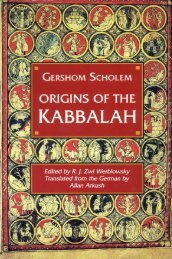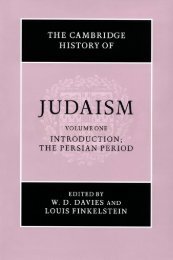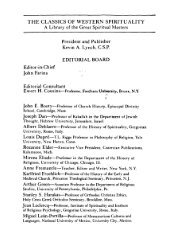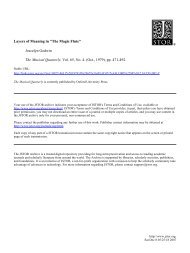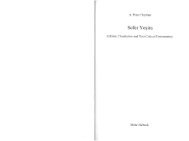You also want an ePaper? Increase the reach of your titles
YUMPU automatically turns print PDFs into web optimized ePapers that Google loves.
CHAPTER 5<br />
Opponents and Observers Respond<br />
[<strong>The</strong>y are] only such Matters as are consistent with Hypocrisy, Delusion,<br />
good Guessing, subtle Scrutinies, underhand Intelligence,<br />
forelaid Contrivance and Artifice, the Warmth of a Delirious and Enthusiastic<br />
Imagination, or, at most, the Power and Activity of Evil<br />
Spirits, whose Agency, no doubt, must be necessary to the working<br />
of those Signs and Wonders, which, if it were possible, would deceive<br />
the very Elect.<br />
—Eubulus, Censura Temporum 1, 4 [1708]: 116, on the French prophets 1<br />
At the height of the fervor, most Jews either became followers<br />
or were open to the likelihood that Shabbatai was really the messiah.<br />
Among the stalwart dissenters who rejected him, by far the most outspoken<br />
was Hakham Jacob Sasportas of Hamburg. Sasportas preserved a large cache<br />
of letters written by himself and many correspondents from the height of<br />
the movement, and their authenticity is verifiable. <strong>The</strong>se documents, collected<br />
as the Zizat Novel Zvi (Withering of the Flower of Zvi), are not only a<br />
central source on the unfolding of <strong>Sabbatean</strong>ism, but also a window into the<br />
world of an unbeliever who put his life in danger to oppose Shabbatai.<br />
Sasportas’ reactions to the <strong>Sabbatean</strong> prophets reveal a great deal both about<br />
his personal attitudes and about the larger state of religious turmoil in the<br />
mid-seventeenth century. An examination of the many reports on the<br />
movement appearing among European Christians serves to highlight even<br />
more of this turmoil. While the majority of surviving Christian documents<br />
were composed after Shabbatai’s apostasy and are highly deprecatory, many<br />
earlier ones display neutrality and even enthusiasm for the unfolding<br />
events. In this literature it is not the <strong>Sabbatean</strong> prophets that take center<br />
stage, but rather the way developments in the East were both reported and<br />
fabricated to fit Christian prophetic ideas.<br />
Unfortunately, few Muslim records remain dealing with <strong>Sabbatean</strong> events<br />
130


